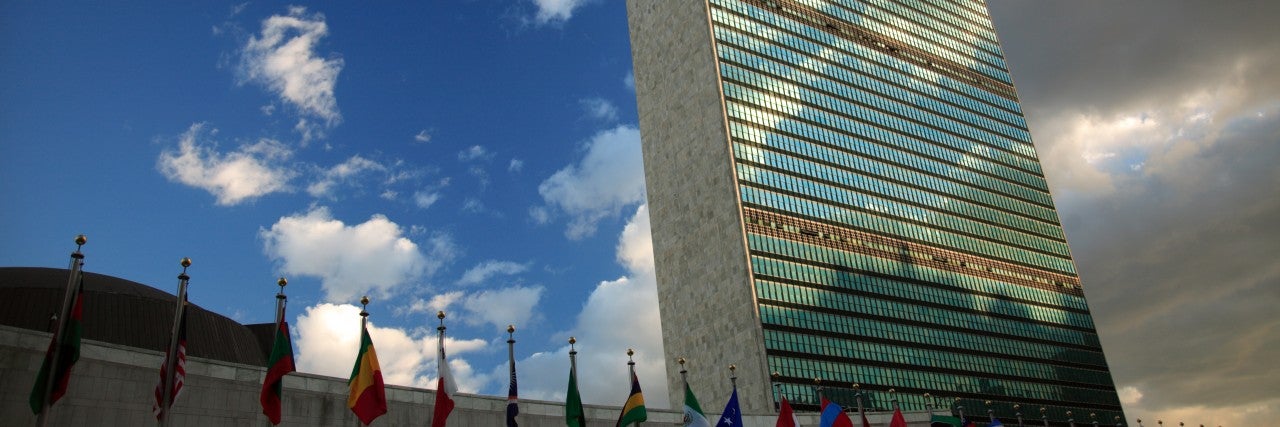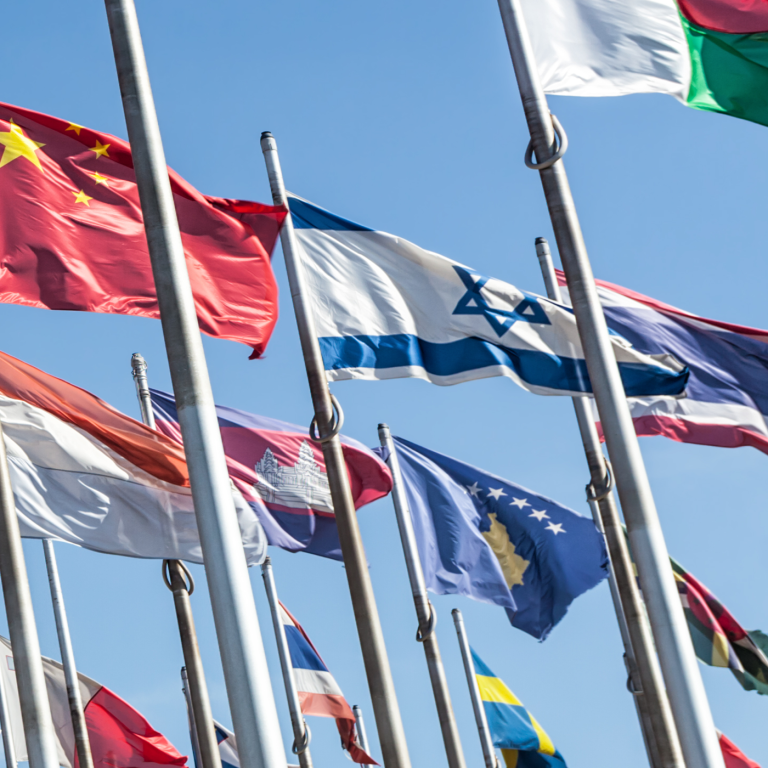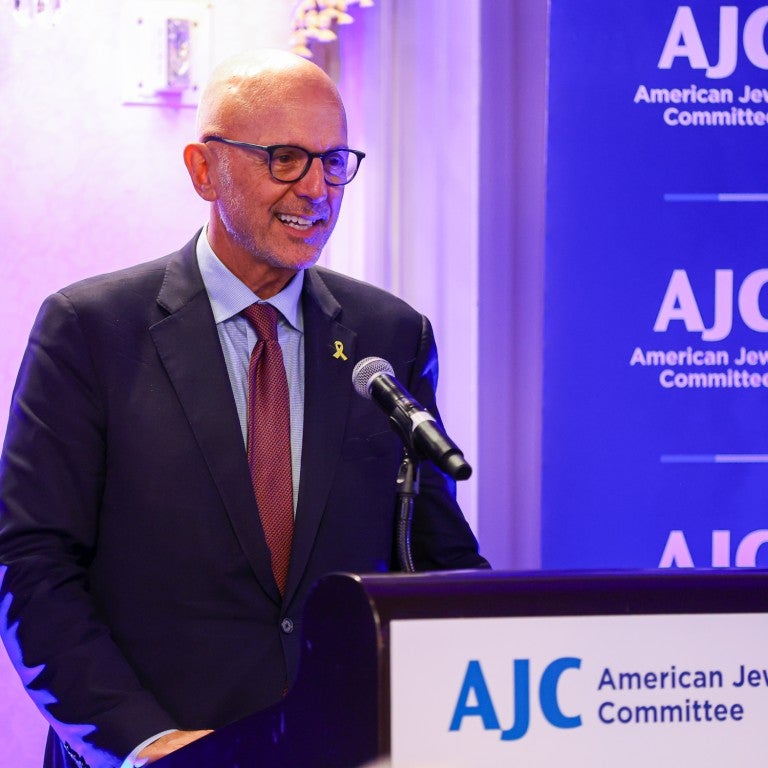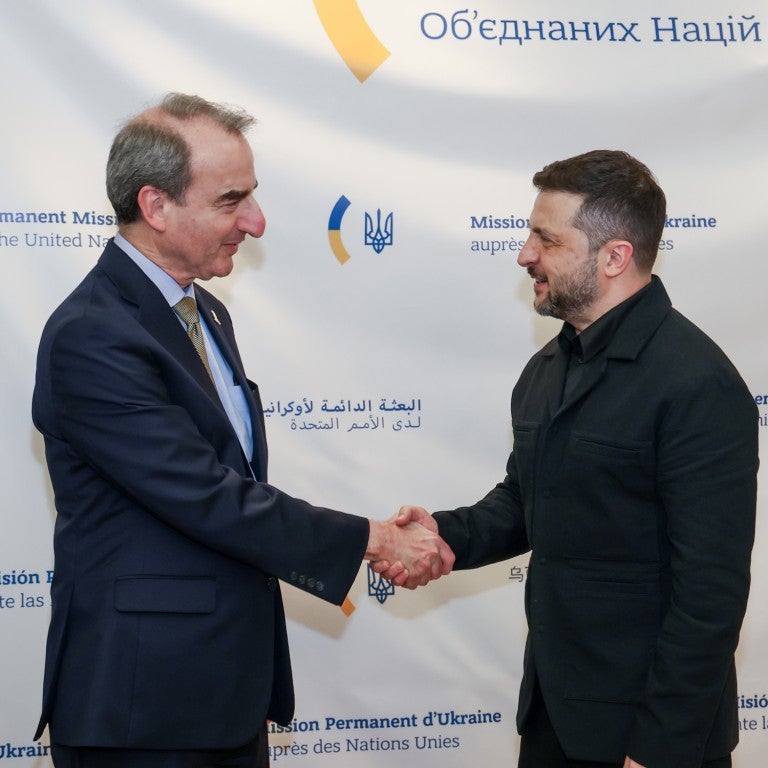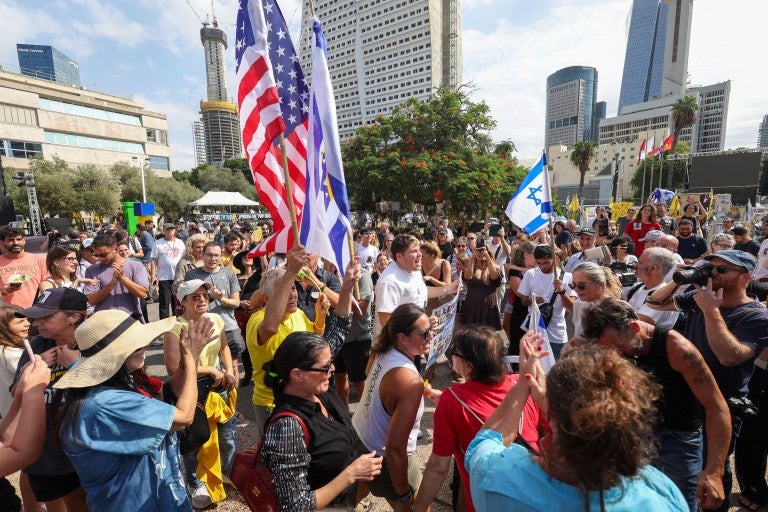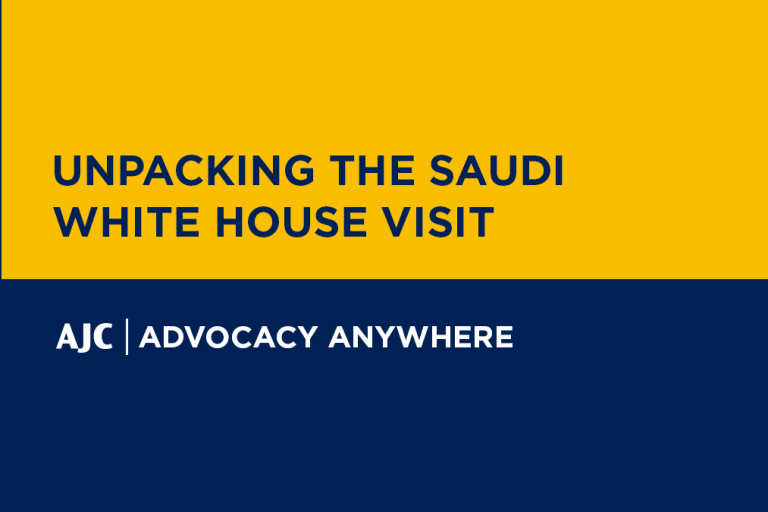September 19, 2025
World leaders will convene at the United Nations on September 23 for the 80th General Assembly. Each year, American Jewish Committee (AJC) leads Jewish diplomatic outreach at this global forum, tackling anti-Israel bias, antisemitism, and the Iranian threat. This year’s meetings unfold amid Israel’s defensive war against Hamas, ongoing efforts to free the hostages, growing international attempts to isolate the Jewish state, and rising antisemitism worldwide.
Here are the top seven action items that AJC, the global advocacy organization for the Jewish people, is advocating for as the UN General Assembly kicks off.
1) Bring the Hostages Home
Background:
- On October 7, 2023, Hamas carried out a terror attack in southern Israel, killing 1,200 and abducting 251 hostages.
- In January 2025, a U.S.-, Egyptian-, and Qatari-brokered ceasefire and hostage agreement led to the staged release of 33 hostages in exchange for Palestinian prisoners and a temporary pause in fighting. Similarly, in November 2023, a hostage and ceasefire agreement saw the release of dozens of Israeli and foreign hostages.
- In May, after 584 days in captivity, 21-year-old American-Israeli soldier Edan Alexander was freed with Red Cross and IDF coordination, a move welcomed by President Trump, who urged Hamas to release all remaining hostages.
State of play:
- Hamas still holds 48 hostages — only about 20 believed to be alive — and denies them medical care, Red Cross access. The hostages include two deceased Americans, Omer Neutra and Itay Chen.
- Hamas has released several propaganda videos of hostages in dire conditions, including an August 2025 clip of Evyatar David, emaciated and forced to dig his own grave, sparking global outrage.
- Negotiations for a full ceasefire and return of all hostages have been repeatedly obstructed by Hamas.
What AJC is doing:
- Since Hamas’ October 7 attack, AJC has advocated alongside 50+ hostage families and mobilized global supporters—through in-person meetings and over 650,000 messages—to urge U.S. and international leaders to take immediate action to bring the hostages home.
- In meeting after meeting with global leaders, AJC experts call for the safe release of all hostages, access to medical care, and adherence to international humanitarian norms.
- This advocacy builds on AJC’s efforts supporting the Dinah Project, a key factor in the UN Secretary-General’s decision to blacklist Hamas for sexual violence, as well as its full-page New York Times ad exposing the brutal conditions of hostage Evyatar David.
2) Opposing Unilateral Recognition of a Palestinian State
Background:
- In recent months, countries including France, Spain, the U.K., Canada, Australia, and Belgium have moved toward recognizing Palestinian statehood, even as Israel remains at war with Hamas following the October 7 massacre. AJC has condemned these actions, noting that rather than advancing peace, they risk rewarding terrorism, deepening instability, and undermining serious diplomatic efforts.
- In September, the UN General Assembly overwhelmingly passed a non-binding resolution endorsing a two-state solution based on the New York Declaration, which the U.S. opposed. AJC urged the resolution’s defeat.
State of play:
- Seasoned observers of international diplomacy will be closely watching speeches from leaders of countries that have announced plans to unilaterally recognize a Palestinian state to see if they follow through on their pronouncements..
- Several countries announced recognition plans with conditions, including Canada (contingent on Palestinian Authority elections), Belgium (tied to the release of all Israeli hostages and the exclusion of Hamas from a future government), and Australia (which called for reforms within the Palestinian Authority).
What AJC is doing:
- In meetings with, and letters to, heads of state and foreign ministers, AJC experts are highlighting the dangers of unilateral recognition of a Palestinian state, which would strengthen Hamas, reward terrorism, and undermine essential Palestinian Authority reforms. Such recognition ignores realities on the ground, violates agreements like the Oslo Accords, threatens Israel’s security, and could derail sustainable peace efforts.
3) Promoting Middle East Integration
Background:
- For more than three decades, AJC has worked to foster understanding and build trust between Jews and Muslims, and between Israel and Arab nations.
- The goal has been to advance normalization agreements such as the Abraham Accords, promote peace, and encourage regional cooperation that benefits all peoples.
- Despite the regional uncertainty since the October 7 attacks, the landmark Abraham Accords, signed in 2020 between Israel, the United Arab Emirates, and later Morocco, have provided stability and partnership.
State of play:
- After October 7, Arab-Israeli relations were thrown into uncertainty, yet AJC continues to deepen engagement with regional partners.
- Opportunities are expected to emerge due to the weakening of Iran’s influence, ongoing reconstruction needs in Gaza, and the possibility of expanded Saudi-American-Israeli consultation and collaboration in economic and security spheres.
- Shifts in Lebanon and Syria present further openings for regional stability and pragmatic engagement.
- Emirati special envoy Lana Nusseibeh warned that if Israel proceeds with annexing portions of the West Bank, it will cross a “red line,” destroy prospects for regional integration, betray the spirit of the Abraham Accords, and kill the two-state solution.
What AJC is doing:
- AJC’s Center for a New Middle East is working to seize opportunities while promoting efforts to advance regional cooperation and integration, greater stability, and the opportunity for a future defined by prosperity rather than perpetual conflict.
- Promoting regional cooperation and integration that prioritizes security, stability, and economic prosperity.
- Expanding quiet diplomacy to sustain and broaden normalization agreements, including behind-the-scenes engagement with political and civil society leaders.
- Highlighting initiatives that support reconstruction and humanitarian needs in Gaza, while ensuring Hamas does not regain control.
4) Countering campaigns against Israel’s legitimacy
Background:
- Israel faces ongoing efforts in international institutions to delegitimize its right to self-defense, including false accusations of war crimes and genocide. These claims ignore Hamas’s deliberate targeting of civilians, use of hostages as human shields, and Israel’s adherence to international humanitarian law. Politicized legal actions and biased UN reports create pressure on other nations to act against Israel while failing to hold Hamas and other Iranian-backed terror groups accountable.
State of play:
- The International Criminal Court (ICC) has issued arrest warrants against Israeli leaders that exceed its jurisdiction and politicize justice, while South Africa has filed a baseless Genocide Convention case at the International Court of Justice (ICJ), and a UN Commission of Inquiry has accused Israel of genocide—claims Israel strongly rejects—creating political pressure that ignores the threat posed by Hamas..
What AJC is doing:
- Urging governments to reject the ICC’s unfounded actions and refuse enforcement of arrest warrants.
- Pressing governments to recognize Israel’s actions are directed at Hamas, not Palestinian civilians, and to reject false genocide claims.
- The false accusation of genocide, increasingly normalized in public discourse, slanders Israel, provides a basis for proposed international sanctions and censure, and fuels hatred around the globe. AJC urges governments to follow the lead of the UK, as well as the U.S., Germany, Austria, and others, and discredit this unfounded, politicized claim.
- AJC welcomes the U.S. withdrawal from the UNHRC and funding cuts to UNRWA as protective of Israel and urges strong alternative leadership on human rights and a viable UNRWA replacement.
5) Countering Iran’s Destabilizing Activities and Nuclear Program
Background:
- Iran continues to threaten regional and global security through its nuclear program, missiles, and terror proxies, prompting Israel to launch Operation Rising Lion on June 13—coordinated with the U.S.—targeting key Iranian nuclear and military sites, after which Iran retaliated with missiles and drones that killed 30 civilians, leading to U.S. precision airstrikes on June 21 on key Iranian nuclear sites and a ceasefire on June 23.
State of play:
- During the 12-day June 2025 conflict, Israeli and U.S. strikes heavily damaged Iran’s enrichment facilities. However, the status of its roughly 440.9 kg (972 lbs) of uranium enriched to 60 percent—near weapons-grade—remains uncertain.
- In August, the U.K., France, and Germany (the E3) launched a one-month process to reimpose “snapback sanctions” lifted under the 2015 nuclear deal.
- Following months of suspension, Iran signed a new IAEA agreement in Cairo in September, allowing renewed inspections under a revised framework.
What AJC Is doing:
- AJC experts note that the Israel-Iran conflict reshaped regional dynamics, reaffirmed U.S.-Israel ties, exposed Iran’s isolation, and opened new possibilities for diplomacy, deterrence, and expanding the Abraham Accords.
- AJC welcomed the E3’s decision to trigger UN Security Council “snapback sanctions” on Iran for repeatedly violating the 2015 JCPOA, initiating a process to reinstate sanctions within 30 days.
- AJC has long advocated for the reimposition of UN sanctions in response to Tehran’s repeated violations of its commitments.
- AJC is urging the universal designation of Iran’s Islamic Revolutionary Guard Corps (IRGC) as a terrorist entity.
- AJC is calling for International Atomic Energy Agency (IAEA) access to, and continuous monitoring of, declared and suspected nuclear sites.
6) Addressing Surging Antisemitism
Background:
- Since October 7, antisemitism has surged worldwide, including harassment, intimidation, and violence against Jewish communities.
- History shows that when governments fail to protect Jewish populations, they often fail to protect democratic and human rights more broadly.
- Anti-Israel rhetoric and policies have had direct negative impacts on Jewish communities globally, threatening physical safety and social inclusion.
State of play:
- Discrimination against Jews and Israelis is increasing, including hate crimes, online harassment, and restrictions on Jewish communal life.
- Even as governments adopt national strategies, enforcement of anti-discrimination laws remains inconsistent.
- Antisemitism is being normalized in some contexts, necessitating urgent global action.
What AJC is doing:
- Urging governments to adopt the Global Guidelines for Countering Antisemitism, issued in July 2024.
- Promoting adoption of the IHRA Working Definition of Antisemitism, now used by over 800 entities worldwide.
- Serving as a key resource for the UN Action Plan on Antisemitism, launched in January 2025, and pressing for full implementation, including staff training across UN agencies.
- Conducting educational and advocacy campaigns to highlight the link between anti-Israel rhetoric and threats to Jewish communities.
7) Standing with Ukraine
Background:
More than three years since Russia’s full-scale invasion of Ukraine, AJC remains committed to a strong, sustained, and unified international response to Moscow’s aggression.
State of play:
- Malign actors, including Iran and North Korea, continue supporting Russia’s war effort and testing Western resolve.
- Iran has supplied drones, missiles, and other equipment, enabling Russia to intensify attacks on Ukraine and civilian infrastructure.
- Any weakening of Western unity—militarily, economically, or diplomatically—would embolden these actors, underscoring the link between Russian aggression, Iranian proliferation, and broader regional instability.
What AJC is doing:
- Urging continued U.S. and allied military, economic, and humanitarian support for Ukraine and assistance for those displaced by the war.
- Welcoming President Trump’s diplomatic efforts but insisting U.S. engagement remain grounded in transatlantic unity, democratic values, and allied security.
- Insisting that no agreement be made without Ukraine’s full participation; Ukrainian territory must not be ceded; and no restrictions be placed on its NATO aspirations or support.
- Supporting UN efforts to document and hold Russia accountable for systematic human-rights abuses, including through the UN Commission of Inquiry on Ukraine.
Frequently Asked Questions:
What is the United Nations General Assembly (UNGA)?
The United Nations General Assembly (UNGA) is the world’s largest annual gathering of heads of state, foreign ministers, and diplomats. Each September, all 193 UN Member States meet in New York to debate and vote on global issues ranging from security and human rights to development and international law.
Why is the United Nations important for AJC?
For American Jewish Committee (AJC), the UNGA is a critical arena for advancing the Jewish people’s interests, countering antisemitism and anti-Israel bias, pressing for the release of Israeli hostages, confronting Iran’s nuclear threat and terrorism around the world, and securing Israel’s place in the world. AJC global experts lead high-level meetings with presidents, prime ministers, foreign ministers, UN officials, and civil society leaders to ensure that Jewish voices and concerns are heard at the highest levels of diplomacy.
